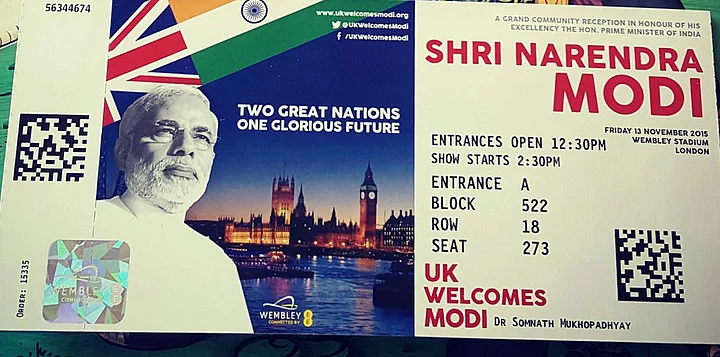My three decades of life in the UK has seen several visits by Indian prime ministers. Previously, we tried hard to follow the news through the UK newspapers and there was barely any reporting on television. To learn more about the visits, you were more likely to get the relevant information through the Indian press than the UK press, as the latter usually relegated the news to well-abridged reporting, usually in the inside pages.
Not so this time. Narendra Modi has captured the imagination and the interest of large sections of the UK public. The average indigenous Briton is engaging with opening statements such as “So the Indian prime minister is visiting the UK?” A substantial majority of the 1.5 million people of Indian origin living in the UK are staunch supporters of the Modi government.
As Lord Bilmoria pointed out on Sky News last night, the loss of Bihar and Delhi in recent elections only underscores the vibrancy of India’s democracy. India will choose the right leader, but when India has made her choice with clarity, it is UK’s role to work with him closely.
BBC’s Take on Modi
Writing for the BBC, Rudra Chaudhuri, senior lecturer at King’s College, London sums it up. “The idea is simple: to unequivocally embrace the optimism set out by Modi. Reservations with regards to India’s advance in her immediate neighbourhood and in international negotiations will be parked away for the time being.”
Under the headline “Marriage à-la-Modi” this week’s The Economist says the close relationship (between Britain and India) will get cosier.
Modi had a busy schedule upon arriving in the UK on November 12. He had lunch with the Queen, addressed a joint session at Parliament with David Cameron, and visited the Mahatma Gandhi statue in Parliament Square.
After attending the event for British Indians at Wembley, he will stay the night at Chequers.
It is hoped that the trip – the first by an Indian prime minister to the UK in almost a decade – will yield billions of pounds in trade and investment deals. Press Association reports that up to £10 billion worth of deals will be signed during the course of Modi’s stay, including the sale to India by BAE Systems of 20 Hawk trainer aircraft.
Why They Came to Wembley
I spoke to several people at Wembley. Kishenji from Birmingham and an Indian-origin couple from Manchester. The following is a summary of their views:
There was a palpable sense of excitement as crowds of people of Indian origin descended on the Wembley stadium. Most of these people have earned their success through hard work. Unlike many successful people in India, they were not born with silver spoons in their mouths. They feel they understand Modi and they appreciate his success.
They want young people of India to have the opportunity of succeeding through hard work. This happens in Britain. Why should it not happen in India? They see Modi as a model of such success. They see rich families that have ruled India generation after generation as contrary to this rags-to-success model. They hope this model will slowly fade away as India becomes a developed country.
They see a successful Modi transforming India into a developed country with greater opportunities for ordinary people. Many of them run businesses. They want to see India and the UK developing stronger and closer business links.
Cameron and Modi
Cameron and Modi came across as leaders with synergistic views. The Indian-origin community is increasingly becoming pro-Conservative. Labour has deserted them. Jeremy Corbyn’s election to position of Labour leader was not received well by the Indian community and Corbyn has not been supportive of the Modi visit.
Indians are beginning to shun Corbyn and are mostly supportive of Cameron. Modi spoke of terrorism and global warming being the two main issues confronting the world. Cameron and Modi emphasised the opportunity created by a strong British-Indian community driving friendship between the UK and India. There was a clear indication of very strong rapport between the two leaders.
Modi spoke in English at the start of his oration and then moved to Hindi. He is an excellent speaker and establishes great rapport with the crowds. His qualities are misunderstood by some of the educated elite in India, who place much importance on correct pronunciation and grammar.
In contrast, many British-Indians have achieved success by getting themselves understood in English as best they can, and indigenous Britons are very supportive of this approach. An indigenous Briton will never criticise a person of Indian origin for their English and will try to understand what is being said. An ‘educated’ Indian is much more likely to criticise an Indian who doesn’t speak good English and is much more likely to make fun of the latter.
A lot of ‘educated’ people in India make fun of Modi. However, Modi’s simple English and his simple jokes (“I know Brooke Bond and James Bond but now rupee bond is entering the London Stock Exchange”) clearly struck a chord with the audience.
The Gathering
I understand from newspaper reports that
never before have 50,000-odd people cheered the leader of a foreign country
anywhere in the world – other than the ovation the Pope receives during his
visits to Catholic countries. The felicitation for Modi and Cameron offered by
the common man was thus unique and will go down in history. After his eloquent
speech, Modi walked round Wembley stadium, to the cheering of crowds. The event
was followed by a fireworks display.
(The writer is a paediatrician living in Brighton)
(At The Quint, we question everything. Play an active role in shaping our journalism by becoming a member today.)
